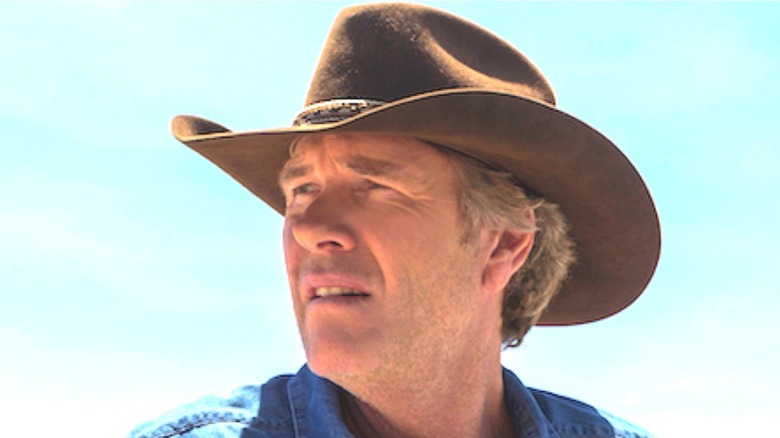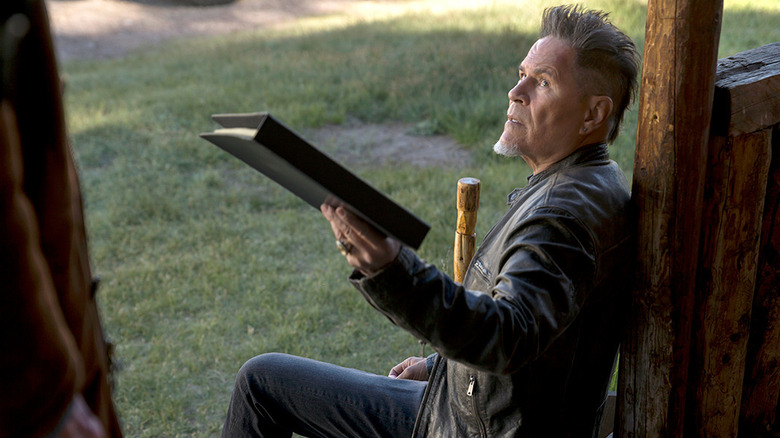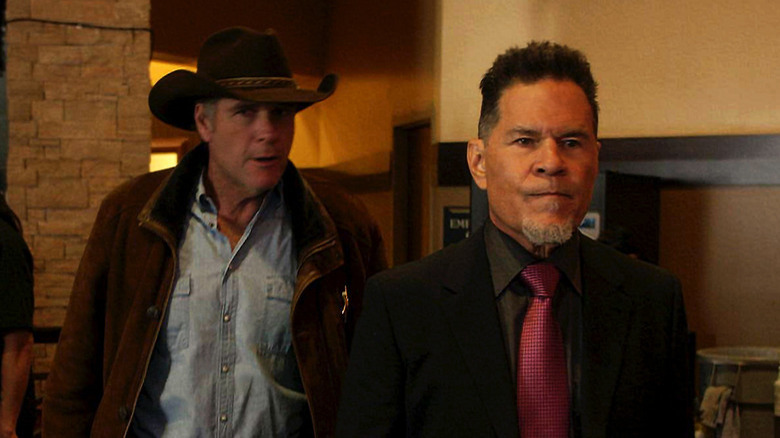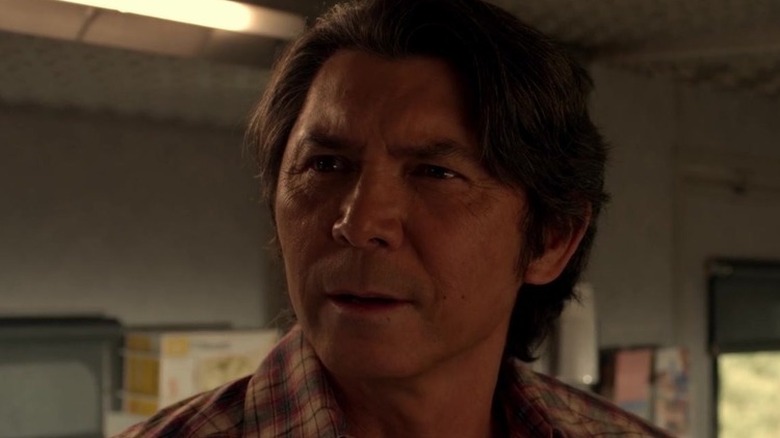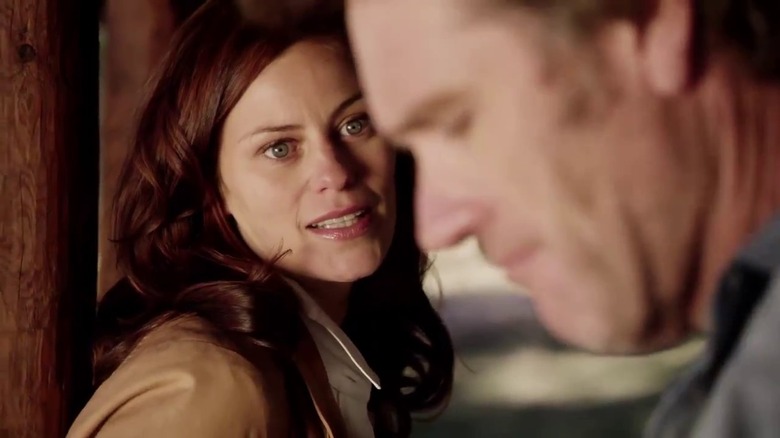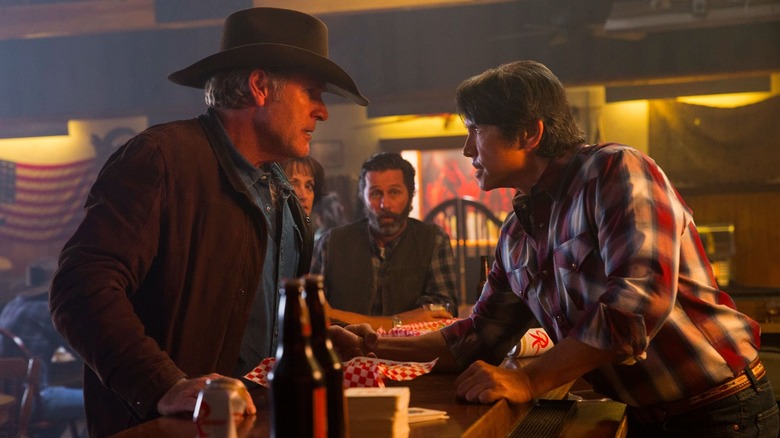The Ending Of Longmire Explained
It has been nearly four years since "Longmire" came to its conclusion on Netflix after six seasons, and it's an ending that still has fans of the modern western show talking. "Longmire" was something of a rarity for a television series, as its first three seasons aired exclusively on A&E before the network suddenly canceled it. That wasn't the end for the show, however, as Netflix picked up the series for an additional three seasons, which allowed it to get the proper ending that fans hoped it would.
"Longmire" focused on Walt Longmire (Robert Taylor), the sheriff of Absaroka County, as he solved various violent crimes that happened both in his own jurisdiction and on the Cheyenne reservation. While Walt was always the driving force of the show, its supporting cast received plenty of screen time and character arcs, all of which were wrapped up in the show's sixth and final season. Its final episode, "Goodbye Is Always Implied," was the culmination of years of storytelling, and a testament to how far the show had morphed into something more serialized from its episodic roots.
So here's how "Longmire" wrapped up its final season, and what it means for the various characters living in Absaroka County.
Nighthorse's casino woes
After taking Henry Standing Bear (Lou Diamond Phillips) to the casino to illustrate its importance to their tribe, Jacob Nighthorse (A Martinez) is accosted by members of the tribe for his shady antics involving profits from the casino. Eventually, he and Henry are forced to leave after gunshots are fired in the crowd. It turns out that this is all a plot by the dastardly villain Malachi Strand (Graham Greene) to kidnap the two men using a mole in Nighthorse's security detail.
Malachi plans to force Nighthorse to relinquish control of the casino over to him so that he can use the place for his own, arguably far shadier business practices. He threatens to kill Henry if Nighthorse doesn't do what he asks, and Nighthorse reluctantly agrees to Malachi's demands. However, Nighthorse had different plans before everything went wrong: to sign control of the casino over to Henry while Nighthorse is in prison. Nighthorse wants a good man in control of the future of their tribe, someone not as tempted by criminal activities as he has been.
While this development would certainly help Henry step up into a larger role in the Cheyenne tribe, it truly illustrates Nighthorse's growth over the course of "Longmire." While a corrupt and shady politician/businessman in his own regard, Nighthorse has always justified his actions as what's best for his tribe. His willingness to step aside and let someone else take control of such a vast business venture as the casino — especially someone like Henry, who has never agreed with his methods — shows incredible depth of character.
Walt to the rescue
Walt is informed by Marilyn Yarlott (Tantoo Cardinal), a member of the Crow tribe, that Malachi has been hiding on their reservation. She leads Walt toward Malachi before being fatally shot by one of Malachi's henchmen. Walt is forced to rush Marilyn to the hospital and abandon his quest to take down Malachi for the time being. Eventually, Walt and his deputies — Vic (Katee Sackhoff), Ferg (Adam Bartley), and a newly rehired Zach (Barry Sloane) — find out that Malachi is located at an old sawmill on the Crow reservation and also where Nighthorse and Henry are being held captive. Henry, however, manages to get the upper hand on one of his captives and escape just in time to run into the arriving Walt. They all work together — alongside Chief Mathias (Zahn McClamon) and his tribal police — to systematically take down Mathias' men.
Having dispatched with Malachi's cronies, Walt goes to confront the man himself. The trouble is that Malachi hangs Nighthorse from a chain and forces the cowboy sheriff to choose between chasing him and saving someone he despises. After some deliberation, Walt decides to save Nighthorse and then chase down Malachi. Walt stands in front of Malachi's escaping vehicle, firing shots into the windshield before being tackled out of the way by Vic. Walt is stabbed by Malachi, but Walt manages to shoot the villain dead before he can deliver a killing blow.
All of this is played out in ways that honor the characters and their journeys. Walt spent six seasons accusing Nighthorse of the most heinous crimes, and often being wrong about said accusations. While Nighthorse is not remotely perfect, Walt saving him is a huge moment. This is especially true when he tells Henry that he should take over the casino, which are words that even season five Walt would have never dared to say.
Blossoming romance
Throughout the various action-packed events that take place in "Goodbye Is Always Implied," there are also several side plots occurring. Most of these have been developing all season long or for several seasons. The biggest one, arguably, is the blossoming romance between Vic and Walt. Vic deals with her fear of losing Walt as he places himself in dangerous situation after dangerous situation to finally bring down Malachi. The two finally recognize their feelings for each other toward the end of the show and make love.
While it's a moving moment and a natural conclusion to their intertwined stories, it does not quite end there. Vic confesses that the two will never be the priority in each other's lives because they are ultimately devoted to someone else: Walt to his deceased wife and Vic to the unborn child that she lost in season five of "Longmire." Vic also confesses her fear of losing Walt, and that she's not sure she could handle it. Walt says that she could, and that it's sort of the point of grief. This is a theme that the show has explored since the beginning. Loss and grief may feel like the end, but in reality, one lives on anyway. It's a poignant conclusion to what is arguably one of the big mission statements for the entire show.
Henry's ascension
After saving Nighthorse and stopping Malachi, the former's original plan comes to fruition and Henry takes over running the casino in hopes of steering it in a more honorable direction that will benefit the tribe. Earlier in "Goodbye Is Always Implied," Walt's admission that Henry should take over the casino, despite how Walt may feel about the place, seems to force Henry to think long and hard about the decision. Walt is ultimately right: If a good man doesn't step up to replace Nighthorse, then a bad one certainly will.
Henry has struggled with his place in the tribe since the beginning of the show. While he ran a fairly successful bar, his character arc has seen him agonize over not doing enough for his people. This led to his Hector vigilante arc after the original Hector was killed, and running the casino is probably the place where he can affect the most change for the Cheyenne people. Unlike Nighthorse, Henry won't just assume what's best for everyone, and he also has the respect that Nighthorse ultimately did not have.
Walt's confession
Throughout "Longmire," it's been a big assumption among the characters that Walt refuses to give up being sheriff because he loves the job too much. This is a fair assessment as he's battled against rivals since the beginning, including an election against one of his own deputies. However, this assumption is turned on its head in "Goodbye Is Always Implied," when Walt decides to pay his daughter Cady Longmire (Cassidy Freeman) one last visit before the show comes to an end.
Their relationship has been strained throughout the show, especially when Cady decided to work for Nighthorse and use her skills as an attorney to represent residents who live on the Cheyenne reservation. Of course, Cady decides to resign from her job and gives Walt key information that helps them catch Malachi, and their relationship is seemingly repaired. Walt visits Cady at her office as she's packing up the last of her things.
Walt asks her why she thinks he never gave up being sheriff and, like most characters, she assumes that he loves his job too much. Walt refutes this, however, saying that he has never loved the job. He's grateful for it, of course, but he has simply been waiting for the right person to replace him. Walt reveals that he believes that Cady is the right person. This is an admission that sort of comes out of left field, considering Cady's own journey, and Cady does seem confused at first. Walt, however, says she knows more about police methods than he did when he joined the force.
Cady ultimately decides to run for sheriff after Walt retires. It's not really something that feels natural to Cady's character, but it's easy to see believe the daughter following in the father's footsteps. Cady ends her part of the show by setting up signs for her run for sheriff and seemingly entering a relationship with Zach the deputy.
Walt's retirement
The series comes to its conclusion with Walt retired and happy, possibly searching for the buried treasure that Lucian (Peter Weller) claimed to have found before his death. It also shows Walt's growth as a character, as he now owns a cell phone, a piece of technology that he never owned before. It's a quiet moment, and the smile on Walt's face illustrates that he is now at peace with his life and the things he has done throughout the show.
Some may argue that it leaves the door open for more "Longmire," either with Walt somehow drawn back into another case or told through the perspective of Cady as the new sheriff of Absaroka County. In fact, Craig Johnson, author of the "Longmire" books, has hinted (via My Country 95.5) that movies taking place after the show could potentially happen. Even without that continuation, "Goodbye Is Always Implied" wrapped up "Longmire" in a way that honors both the characters and the fans of the long-running show.
